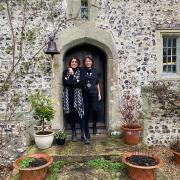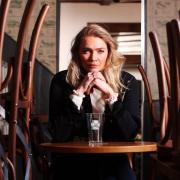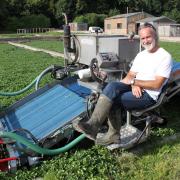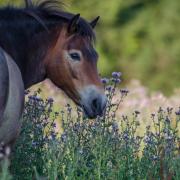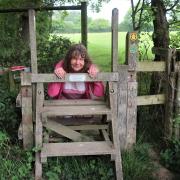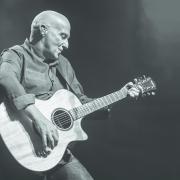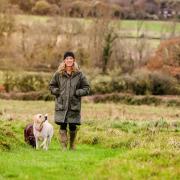Sussex folk singer Shirley Collins was a linchpin of the English folk revival of the 1950s and 1960s. Now, after four decades out of the spotlight, she’s releasing a new album. Veronica Groocock visited her home in Lewes to find out more
Mention Sussex folk singer Shirley Collins and the words ‘living legend’ spring easily to mind. It’s an apt description of someone whose contribution to the English folk revival of the 1950s and 1960s has been massively influential. Now, after a lengthy absence from live performance – four decades, no less – Shirley Collins is re-emerging, at 81, into the musical spotlight with a brand new set of recordings. Lodestar is an eclectic collection of English, American and Cajun songs dating from the 16th century to the 1950s. It was recorded live on to a laptop at Shirley’s home in Lewes, tucked away in a quiet street of Victorian cottages.
She welcomes me in, apologising for the clutter. It all looks very neat to me, but homely and unostentatious. I ask her how it feels to be singing again for the first time since she, literally, lost her voice back in the early 1980s: a form of dysphonia (“When I tried to sing, what came out didn’t sound like me at all and I just had to let it go”) and withdrew from performing.
“It’s extraordinary, exciting and I’m enjoying it”, she says, her face lighting up with enthusiasm. “The songs have been in my head all the time and there are still plenty more to record, but it’s as if I’ve been given a new lease of life”.
The whole experience was eased for Shirley by the informal setting. Not having sung for such a long time, she was reluctant to go into a studio, feeling more at ease recording in her own home, with people around her who knew her – including Ian Kearey, the record’s producer and musical director. “We were just very relaxed about it and let it happen“, she says.
There was much laughter, Shirley recalls, as the songs competed with various noises-off from the street outside, with takes delayed or interrupted by the sound of skateboards, motorbikes and little children rushing by from the local nursery school. Some exquisite birdsong wafting through the kitchen window during Cruel Lincoln, a ballad of brutality and vengeance, was kept in as part of the soundtrack – an intriguing juxtaposition.
At one stage Shirley’s low-ceilinged front room was taken over by a full drum kit and a very tall Morris dancer.
The result is a distinctive rendering of some powerful songs, albeit with a tendency to gruesome themes, delivered in Shirley’s characteristically natural voice which, despite the passing of the years, has retained its simplicity and purity of tone. She says she has always striven to maintain the honesty of the songs she sings, without dramatising them.
And several top-class musicians provide an evocative backing via a variety of instruments including cello, viola and hurdy-gurdy.
What triggered her decision to sing again, after 40 plus years?
“I really did think it was all over and that I wouldn’t be singing in public again, but David Tibet (of folk band Current 93) persuaded – nagged – me into it”. As did her longtime friend, actor and guitarist Pip Barnes. Pip and Shirley have toured together giving illustrated talks on English folk songs (notably A Most Sunshiny Day, focusing on Sussex music in particular).
In the intervening years, had she ever contemplated making any kind of musical comeback? “I’d longed to, but felt it would be a foolish move, and perhaps a humiliating one. Finally, I just realised that the songs that I sing were originally recorded by old people anyway, and mostly unaccompanied”. And, she adds, laughing: “I felt it doesn’t matter – it’s just vanity!” In typically downbeat fashion, she likens the situation to that of somebody who was once an athlete and then has to use a walking stick – “but not quite as bad as that”.
Born in Hastings, Shirley spent her childhood there, along with her late sister Dolly. The family shared a deep love of traditional English folk song. It was Shirley’s grandparents who first ignited her passion for the music.
“They sang to Dolly and me during the war, when we were in the Anderson shelter. Night after night, if there were raids, they would sing to us to make us feel secure. It all just took hold of me – penetrated my mind. It was always the music I loved best. And that never left me”.
Later on, she and Dolly sang together in local venues. “My mum was an ardent socialist, and there was a place in Hastings called the Oakwood Hotel where they had socials – for the socialists! Dolly had a guitar and that’s when we first started singing in front of people”.
It was fun, she says, except for her mother’s “vehement” political views: “It put me off politics for life! My granny used to say, at family dinners: ‘No religion, no politics’. But at least it gave Dolly and me a platform to start singing on and gain a bit of confidence.”
Aged 18, Shirley left Hastings and immersed herself in the emerging London folk scene. In 1954, at a party hosted by Ewan MacColl, she met American folklorist Alan Lomax and became romantically involved with him. Five years later, she travelled to the southern states of America as his assistant, collecting pioneering field recordings of traditional music – two of which are on the new CD.
It was a thrilling but scary chapter in her life. “It was quite dangerous at times. We were deep in the heart of Mississippi, in a penitentiary recording work songs, and up in the mountains in Kentucky, with these terrifying religious sects.
“On the other hand, people were incredibly hospitable and welcoming, and they loved to hear the versions of their songs that I was able to sing then – and they were very proud of their British origins. The connections are still so strong there…”
Back in Britain, Shirley set about establishing herself as one of our most authentic singers and recording artistes throughout the folk revival of the 1960s and 1970s.
She remembers a brief but heady encounter with Jimi Hendrix. Her husband at the time, record producer and songwriter Austin John Marshall, was making a film about Hendrix. “Jimi came out to see us in Blackheath, where we were living then. He did whisper something quite sweet in my ear! Also, my daughter Polly sat on his knee. He was such a lovely man”.
Polly now acts as Shirley’s manager. She lives in Somerset “but comes over from time to time to keep me in order! My family seem to think I need a manager, now that I’m singing again!” Her son Robert lives in Ramsgate and manages a band.
In 1971 Shirley married musician and founder member of Steeleye Span, Ashley Hutchings, and they formed the Etchingham Steam Band, whose repetoire was drawn from Sussex songs. They appeared at numerous venues: from big festivals abroad to the National Theatre and Royal Albert Hall to the upstairs rooms of pubs. Their first gig was in Lewes, at the Lewes Arms which – due to the frequent power cuts at that time – was candlelit.
She believes that singing in pubs and folk clubs “keeps your feet on the ground. You can’t get carried away with your own importance”. She enjoys the intimacy of such places – being so close to her audience. “I like being able to talk directly to people”.
In the early days, not everyone shared her love of traditional music. “People had the idea that English folk songs were all fah la las and repetitive choruses, milkmaids and shepherds – which in part they are. But the big ballads are great works of art.
“They were despised partly because they were sung by ordinary labouring people.
“Cecil Sharp (the great collector of English songs in the 1900s) rescued them before World War I”. Thanks to Sharp, says Shirley, thousands of songs were saved – “and some of them are absolutely beautiful. And so English”.
There is, she feels, “a beauty and slight melancholy” about an English folk song that is instantly recognisable. She has fond memories of performing with her sister Dolly, a gifted composer and arranger who “wrote wonderful arrangements for the songs on this beautiful little flute organ that we used all the time. It was such fun being on stage with her. We always got on terribly well and loved each other very much”.
She has lived in Lewes for 14 years. She moved there from Hove, which, although close to the sea, wasn’t close enough to the Downs. “I feel I have to be within reach and sight of the Downs, I love them so. And so Lewes was the ideal place”.
Once a keen walker, she is more limited these days, since the onset of lumbar scoliosis: “My spine is crooked at the base, and walking is very painful. I have one walk that I do still, down to Crowlink from Friston church. I can take short walks, but not the 12 and 15 milers I used to do, I’m afraid”. She looks a little sad.
She belongs to the Baxter’s Field Society: “a beautiful meadow in Lewes that’s privately owned by a group of people who keep it as a safe green place”. And now and again she will drop into the local folk clubs. “I just love being here. It’s peaceful, but not dull, and it’s got lots of character. I live on such a friendly street – they put their chairs out in the evening, and sit outside with drinks and food, and kids run up and down and play. It’s quite old-fashioned really”.
I wonder how she feels about re-entering the public arena in the frenetic age of the internet?
“I find all that quite tiresome, although Polly does a lot of stuff on Facebook for me. I’m sort of private but ‘social’ at the same time. I have this great passion for music that I really want to pass on to people”.
During the ‘silent’ years, she couldn’t bring herself to sing out loud, even in the seclusion of her own home. “I was so embarrassed by the sound of my voice, I hated it so much that I just had to let it go”. Does she sing around the house now? “Yes, I do”, she says. So something, after all these years, has been released in her? “It has”, she says, laughing, “It’s a bit late but it’s lovely. I used to think about it all the time anyway, wanting to, but with proddings from various people, it slowly happened and I thought: ‘What have I got to lose?’
Shirley is philosophical about this new phase in her life. “I’m brave enough to go and do stuff now. I still worry about how the sound will come out and I would rather I was able to sing as I used to, but that’s not realistic, so I just forgive myself and do the best I can”.
Lodestar, along with the tour to promote it, is, I suggest to her, an ideal antidote to ageism. She agrees. “What’s great”, she says, “is that we’ve all got some spirit left in us, which shouldn’t be neglected, overlooked or laughed at”.
More…
• Henry Normal on rediscovering a more personal way of communicating - Screenwriter, producer and Steve Coogan’s former business partner Henry Normal hadn’t written any poetry in two decades. Then a combination of family circumstances drove him to rediscover an intimate way of communicating. He spoke to Jenny Mark-Bell




